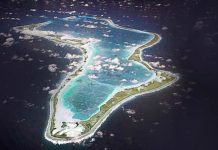A report released by the United Nations Economic and Social Commission for Asia and the Pacific (ESCAP) predicted Pakistan’s GDP to remain lowest in the region at 4.2 per cent in 2019 and 4pc in 2020 compared to Bangladesh’s 7.3%, India 7.5%, Maldives and Nepal 6.5% each in 2019. EurAsian Times stumbles upon a report from Dawn.
Indian Economy Surpassess France to Emerge 6th Largest: World Bank
The survey revealed that overall economic conditions in the region are stable with the projected 5-5.1 per cent GDP growth in 2019 and 2020 respectively. However, export-oriented sectors face headwinds from weaker demand in Europe and possibly in US, and looming uncertainty over ongoing US-China trade war.
Pakistan’s economy is experiencing severe balance of payment difficulties amid large fiscal and current account deficits and mounting pressures on the currency, the report adds.
Inflation in the developing Asia-Pacific region is forecast to increase moderately in 2019 to 4.2pc before dropping to 3.8pc in 2020. However, potentially higher tariffs against the backdrop of trade tensions and rising uncertainties, currency depreciation and unfavourable weather could push up consumer and food prices.
According to the survey, the region’s medium-to-long term prospects depend on structural transformation and broad-based productivity growth. The report cautions against countries shifting from an agriculture-based economy to one in which services play a dominant role, bypassing manufacturing sector.
New frontier technologies may reduce the scope for industrialisation in “late entrant” developing countries, while high-value-added services require skilled workers. This calls for investment in people and enabling infrastructure, the survey suggests.
Pakistan Face The MBS Wall As Riyadh Halts $3.2B Oil Facility for Pakistan
Stating that the next phase of structural transformation in the region must be environment-friendly, the survey illustrates that investments to speed up the transition to more resource-efficient systems of production and consumption would not only reduce carbon emissions by a tenth but deliver high economic returns and over time can reduce net financial costs to zero.
The 2019 survey points out that achieving Sustainable Development Goals by 2030 would require an annual additional investment of $1.5 trillion for Asia-Pacific developing countries — equivalent to 5pc of their combined GDP in 2018.
Despite rapid economic growth, the survey notes, too many people are left behind, without a fair chance in life, while environmental degradation has reached alarming levels, threatening the sustainability of past development gains. Hence, keeping the old paradigm of prioritising GDP growth at all costs is neither feasible nor desirable, the report argues.
More News at EurAsian Times
- Indian Military Base in Vietnam To Protect Hanoi’s Territorial Interest
- Indian Military Base in Indonesia can Strangle China at the Strait of Malacca
- Saudi Money, US Weapons, Israeli Intelligence Fuelling Arab NATO – Iran
- Will Ayni Airbase in Tajikistan Become India’s 1st Overseas Military Base?
- Indonesia Opens Another Military Base at Natuna Islands To Counter Aggressive China




